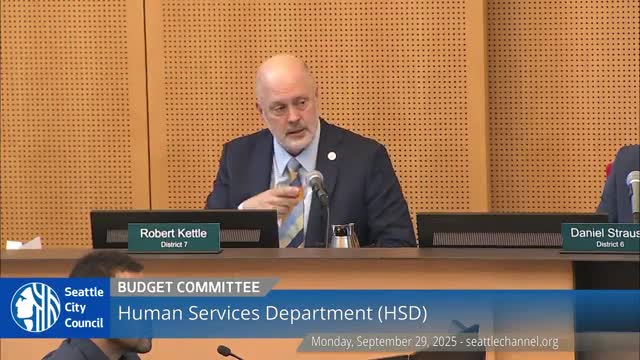Seattle Council Works on Homelessness and Wage Equity Initiatives Amid Budget Discussions
September 30, 2025 | Seattle, King County, Washington
This article was created by AI summarizing key points discussed. AI makes mistakes, so for full details and context, please refer to the video of the full meeting. Please report any errors so we can fix them. Report an error »

Seattle's Select Budget Committee convened on September 29, 2025, to address critical funding and planning issues related to public safety and homelessness. A significant point of discussion was the allocation of funds to the King County Regional Homelessness Authority (KCRHA) for new housing projects. The committee highlighted a snag in the process, as one of the proposed sites for a new facility fell through due to challenges with the juvenile detention center's location. This has prompted ongoing collaboration with King County Council members to identify a suitable alternative site within Seattle city limits.
The committee confirmed that the KCRHA is responsible for shaping the Request for Proposals (RFP) for the new housing project, with expectations for the RFP to be issued in 2026. This aligns with the city's five-year plan to expand various housing types and address homelessness effectively.
In addition to housing, the committee discussed fiscal support for 211, a vital resource for community members seeking human services. The Human Services Department (HSD) confirmed that it provides funding for 211, emphasizing its role in connecting residents to necessary support.
Another key topic was wage equity for social service providers. The committee acknowledged the need for increased wages, as highlighted by a University of Washington study. The proposed budget includes a 4.6% wage increase for community providers, with 2.6% tied to inflation and an additional 2% as a discretionary increase from the mayor. This funding is sourced from the general fund, underscoring the city's commitment to supporting frontline workers who often commute from outside the city due to housing affordability issues.
Lastly, the committee reviewed proposed investments in food security, amounting to $10.3 million. These investments are categorized as one-time allocations, contingent on voter support for a business and occupation tax package. The uncertainty surrounding federal funding for food programs was noted, reflecting the complexities of securing ongoing support for community needs.
As Seattle moves forward with these initiatives, the committee's discussions underscore a focused effort to address homelessness, support social service providers, and enhance food security, all critical components of the city's broader strategy to improve community welfare.
The committee confirmed that the KCRHA is responsible for shaping the Request for Proposals (RFP) for the new housing project, with expectations for the RFP to be issued in 2026. This aligns with the city's five-year plan to expand various housing types and address homelessness effectively.
In addition to housing, the committee discussed fiscal support for 211, a vital resource for community members seeking human services. The Human Services Department (HSD) confirmed that it provides funding for 211, emphasizing its role in connecting residents to necessary support.
Another key topic was wage equity for social service providers. The committee acknowledged the need for increased wages, as highlighted by a University of Washington study. The proposed budget includes a 4.6% wage increase for community providers, with 2.6% tied to inflation and an additional 2% as a discretionary increase from the mayor. This funding is sourced from the general fund, underscoring the city's commitment to supporting frontline workers who often commute from outside the city due to housing affordability issues.
Lastly, the committee reviewed proposed investments in food security, amounting to $10.3 million. These investments are categorized as one-time allocations, contingent on voter support for a business and occupation tax package. The uncertainty surrounding federal funding for food programs was noted, reflecting the complexities of securing ongoing support for community needs.
As Seattle moves forward with these initiatives, the committee's discussions underscore a focused effort to address homelessness, support social service providers, and enhance food security, all critical components of the city's broader strategy to improve community welfare.
View full meeting
This article is based on a recent meeting—watch the full video and explore the complete transcript for deeper insights into the discussion.
View full meeting
